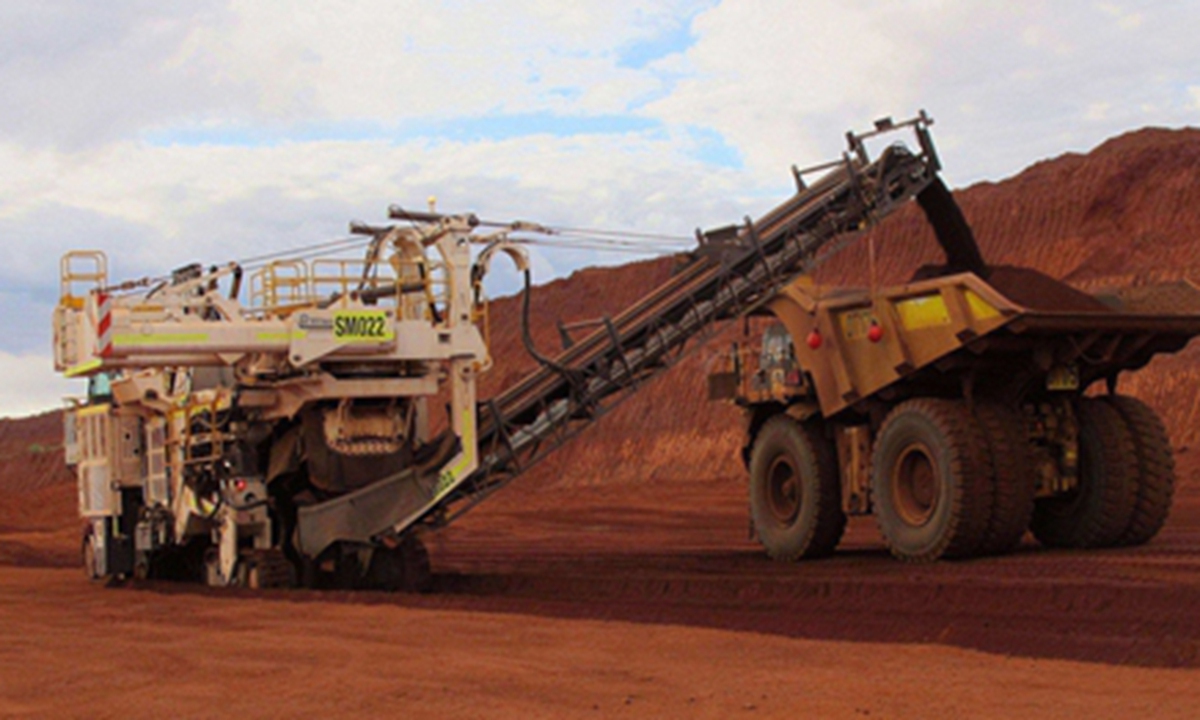Iron ore imports from Australia drop, showing trend for bilateral trade
Source: Global Times Published: 2020/8/27 14:14:42

An iron ore mining site in Australia Photo: cnsphotos
Australia saw robust exports to China in the first half of the year, showing its increased dependency on the Chinese market, but it then recorded a 17 percent decline in exports to China in July, with metalliferous ores exports falling 12 percent from the level in June.
Other Australian exports to China, especially resources, declined as well. For instance, its coal exports to China dropped 42 percent during the same period, according to data from the Australian Bureau of Statistics.
Under pressure from the US, Australia has been allowing its relationship with China to decline during the past few months, which has brought risks for Chinese firms doing business with Australia. In order to manage potential risks, the firms have been impelled to diversify their suppliers.
Per data from India's Department of Commerce, its exports of ore to China in July surged 53.18 percent year-on-year. Also, China imported 17.7 million tons of iron ore from Brazil in July, more than double the 7.7 million recorded in the previous month, Reuters reported. With COVID-19 coming under control, China has been speeding up its economic recovery and there is increasing demand for resources and raw materials.
Owing to the correlation between economics and politics, it is inevitable that economic activities will be impacted by the political environment. Regarding the iron ore supply as a bargaining chip, certain Australian politicians even said that Australia could inflict "serious damage" on China by boycotting iron-ore trade, according to local news outlets. With that threat hanging in the air, Chinese importers have had to seek more suppliers so as to avoid any potential losses.
Besides, the months of malignant moves that the Morrison administration has made toward China has sparked antipathy among Chinese netizens, which could result in replacement of daily consumption of Australian products, such as agricultural goods which are easily replaceable.
The same goes for Chinese investment in the Australian market. During the past few years, Chinese investment in Australia has slumped due to Canberra's heightened scrutiny of Chinese capital. According to data from the University of Sydney, Chinese investment in Australia fell 58 percent year-on-year in 2019. The figure may further dip this year.
The Morrison administration recently blocked Chinese dairy behemoth Mengniu Dairy's plan to buy an Australian dairy brand. The continuously deteriorating investment environment will cast a shadow on other foreign capital as well.
Ups and downs in global trade are normal. Though a short-term contraction could not tell the whole story, it reveals a signal that economic and trade relations between China and Australia may keep cooling down.
The two nations enjoy economic complementarities. With the coronavirus pandemic continuing to affect the global economy, it would be a better path for the two sides to resolve their disputes, which would benefit both sides.
The article was compiled based on an interview with Liu Qing, director of the department for Asia-Pacific Studies at the China Institute of International Studies.
bizopinion@globaltimes.com.cn
Posted in: EXPERT ASSESSMENT